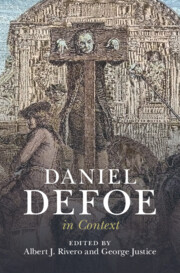Book contents
- Daniel Defoe in Context
- Daniel Defoe in Context
- Copyright page
- Contents
- Illustrations
- Notes on Contributors
- Preface
- Acknowledgements
- Chronology
- Part I Life and Works
- Part II Literary Context
- Part III Authorship and Copyright
- Part IV The Monarchy and Parliament
- Part V Social Structures and Social Life
- Chapter 23 The Penal System
- Chapter 24 Defoe and Religion
- Chapter 25 Social Status and Social Mobility
- Chapter 26 Education and Opportunity
- Chapter 27 Men and Women
- Chapter 28 Defoe and China
- Chapter 29 London, 1660–1731
- Chapter 30 The Environment
- Chapter 31 Marriage Law
- Chapter 32 Daniel Defoe and the Law of the Sea
- Chapter 33 Disability
- Chapter 34 Defoe and Colonialism
- Chapter 35 Defoe and Animals
- Chapter 36 Defoe and Slavery
- Chapter 37 Economics
- Chapter 38 Defoe and the Supernatural
- Chapter 39 Defoe and America
- Part VI Critical Fortunes and Literary Afterlife
- Further Reading
- Index
Chapter 37 - Economics
from Part V - Social Structures and Social Life
Published online by Cambridge University Press: 27 April 2023
- Daniel Defoe in Context
- Daniel Defoe in Context
- Copyright page
- Contents
- Illustrations
- Notes on Contributors
- Preface
- Acknowledgements
- Chronology
- Part I Life and Works
- Part II Literary Context
- Part III Authorship and Copyright
- Part IV The Monarchy and Parliament
- Part V Social Structures and Social Life
- Chapter 23 The Penal System
- Chapter 24 Defoe and Religion
- Chapter 25 Social Status and Social Mobility
- Chapter 26 Education and Opportunity
- Chapter 27 Men and Women
- Chapter 28 Defoe and China
- Chapter 29 London, 1660–1731
- Chapter 30 The Environment
- Chapter 31 Marriage Law
- Chapter 32 Daniel Defoe and the Law of the Sea
- Chapter 33 Disability
- Chapter 34 Defoe and Colonialism
- Chapter 35 Defoe and Animals
- Chapter 36 Defoe and Slavery
- Chapter 37 Economics
- Chapter 38 Defoe and the Supernatural
- Chapter 39 Defoe and America
- Part VI Critical Fortunes and Literary Afterlife
- Further Reading
- Index
Summary
This essay reappraises Defoe’s writings on economics to argue that the fascination of modern economists with Robinson Crusoe is either misplaced or ahistorical. Rather than an exemplary study of production and consumption, the novel is a one-off treatment of Crusoe’s debt – in the form of seeds, tools, and a rifle – to an absent, but paradoxically foundational, world of European trade. In his subsequent novels – The Farther Adventures of Robinson Crusoe and A New Voyage Round the World – Defoe abandons the idea of his heroes as economic lab rats and focuses instead on the fluid and uncertain world of international commerce. Despite the complexities of such trade, Defoe’s novels fictionalize a cultural belief that the unmapped spaces on the globe offer the prospect of what he calls ’infinite Advantage’: the belief that one can use resources indefinitely without using them up.
Keywords
- Type
- Chapter
- Information
- Daniel Defoe in Context , pp. 305 - 329Publisher: Cambridge University PressPrint publication year: 2023

